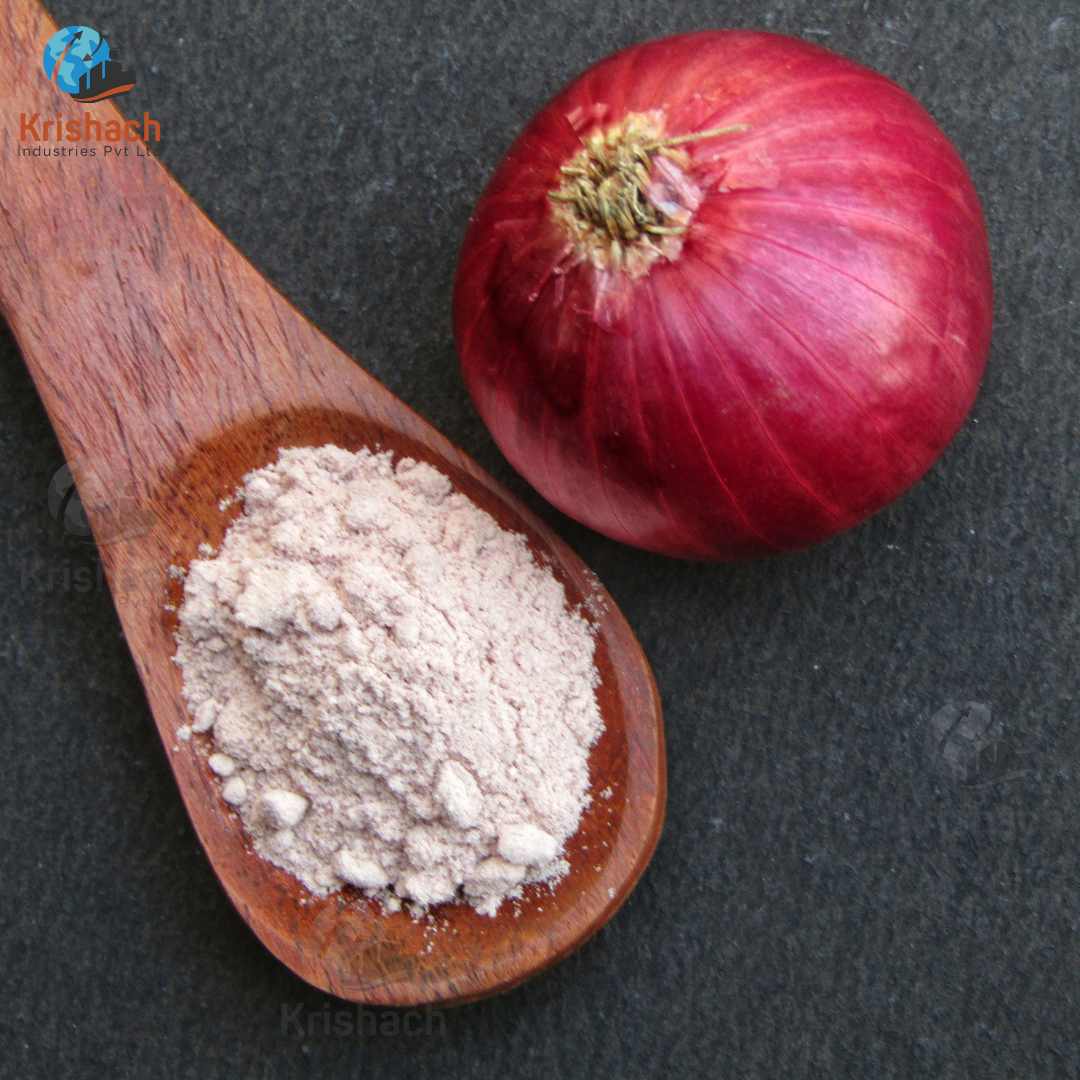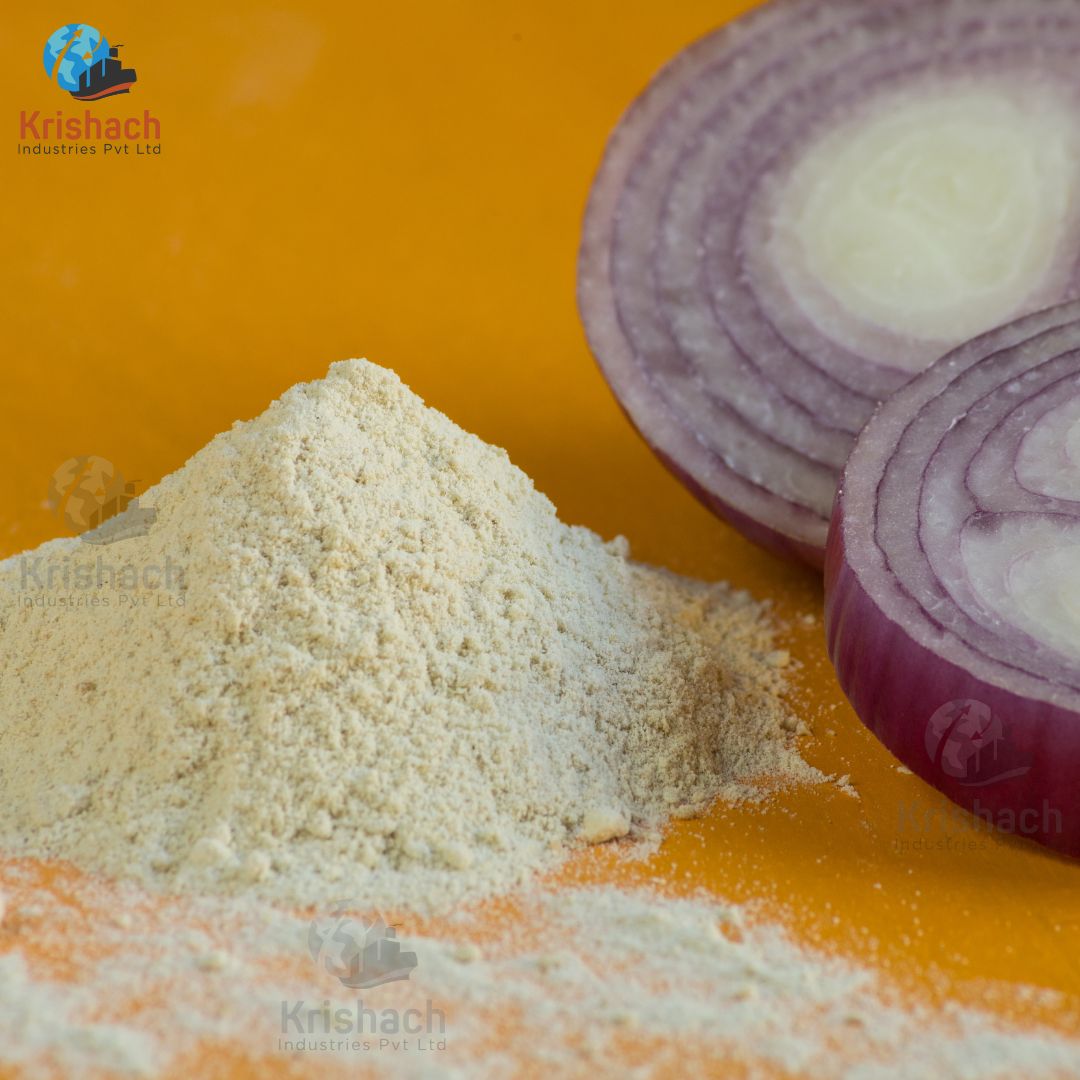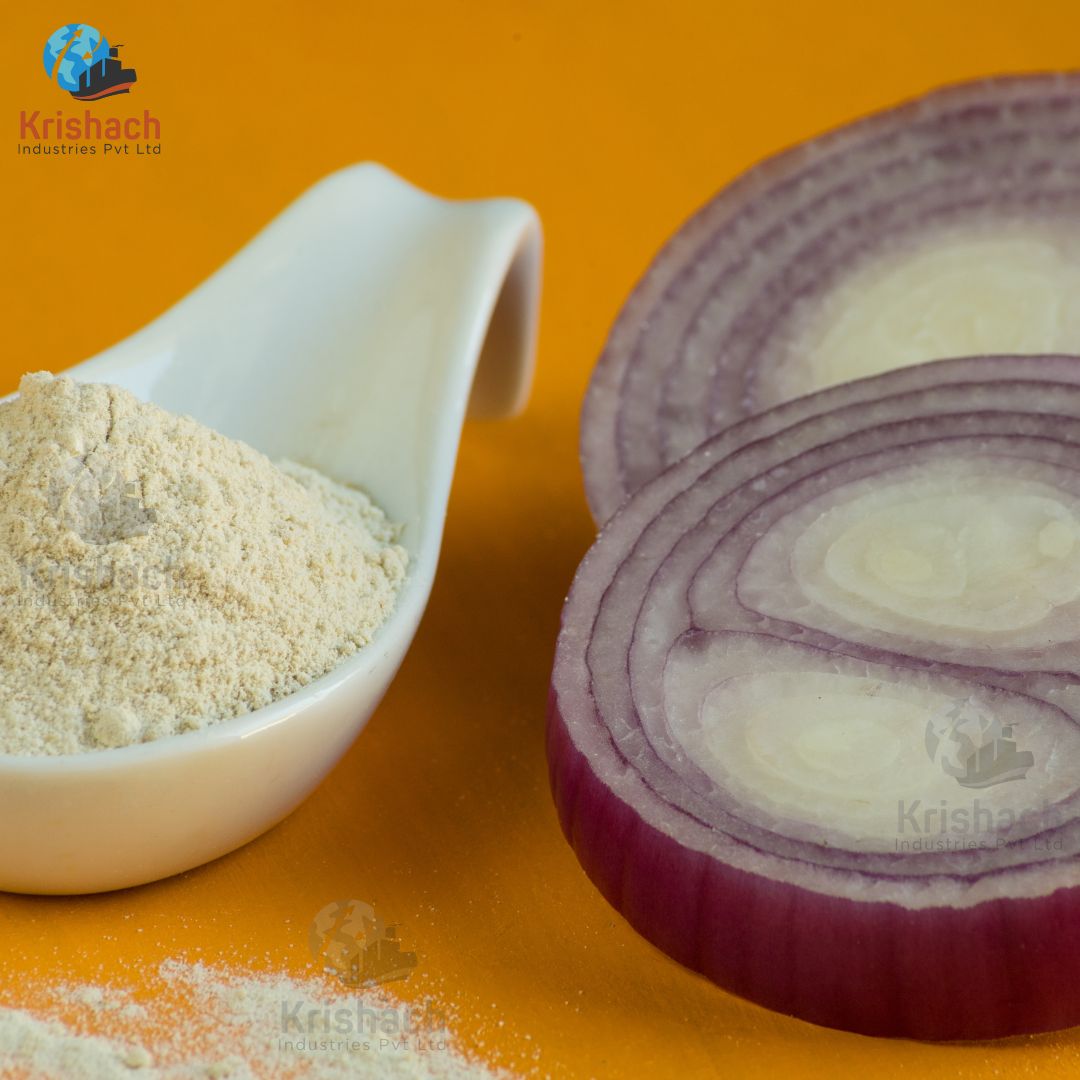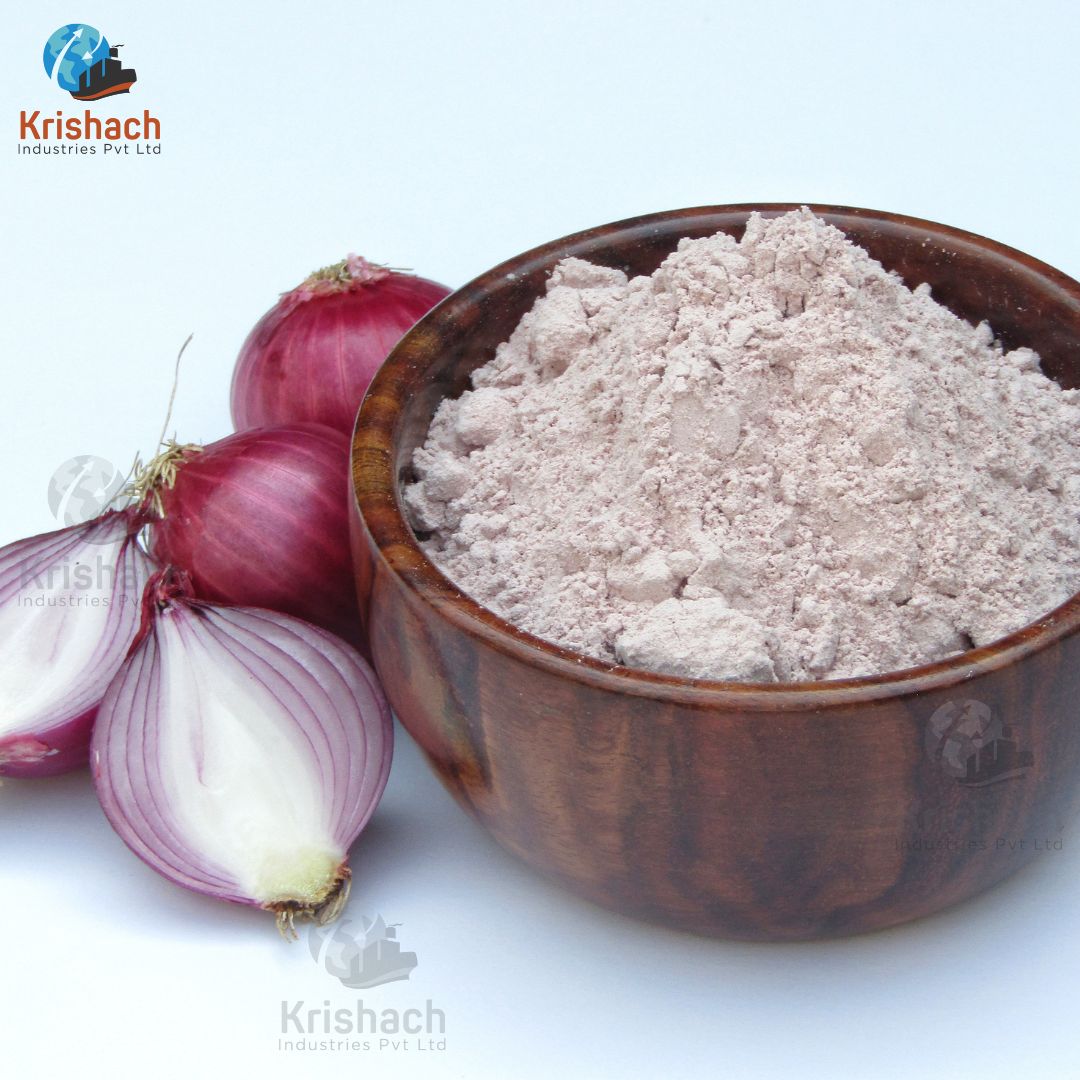Dehydrated Red Onion is a concentrated, long-lasting ingredient derived from fresh red onions through a dehydration process. This versatile product is available in several forms, such as flakes, granules, minced, and powder, and is widely used in the food industry for its intense flavor and convenience. Below are the typical specifications for dehydrated red onion:
Key Characteristics:
Product Forms: Flakes, granules, minced, powder.
Color: Reddish-purple with variations depending on the form and particle size.
Flavour: Strong, pungent onion taste with a slightly sweet undertone.
Aroma: Distinctive and intense onion aroma.
Moisture Content: ≤ 6% (max), ensuring extended shelf life and preventing spoilage.
Ash Content: ≤ 4% (max).
Particle Size:
Flakes: 3-5 mm
Granules: 0.5-1.0 mm
Minced: 1-3 mm
Powder: 100-120 mesh
Shelf Life: 12-24 months when stored in a cool, dry place away from direct sunlight.
Specification:
Usage:
Culinary Applications: Dehydrated red onion is used as a convenient ingredient in a wide range of dishes, including soups, stews, sauces, salad dressings, marinades, and spice blends. It can be rehydrated and used like fresh onion or added directly to dishes during cooking for a strong onion flavor.
Processed Foods: Commonly used in prepared meals, snacks, dips, and seasoning mixes to enhance flavor without the need for fresh onions.
Seasoning and Spices: Often included in spice mixes and seasoning powders for its robust flavor profile and easy incorporation.
Long Shelf Life: It is ideal for long-term storage and use in environments where fresh onions are not readily available or practical.
Nutritional Benefits of Dehydrated Red Onion:
Rich in Antioxidants: Contains quercetin and anthocyanins, powerful antioxidants that help combat free radicals and reduce inflammation.
Low in Calories: A low-calorie ingredient that adds flavor without contributing significantly to calorie intake.
Dietary Fiber: Provides dietary fiber, which supports digestive health and helps regulate blood sugar levels.
Vitamins and Minerals: Contains small amounts of essential vitamins and minerals such as vitamin C, B vitamins, potassium, and calcium, contributing to overall nutritional value.
Antibacterial Properties: Possesses natural antibacterial and antimicrobial properties, which can help support immune health.
Low Sodium Content: A naturally low-sodium food, making it a heart-healthy choice for seasoning without adding excessive salt.
Our Services
Reliable Sourcing:
To ensure high-quality dehydrated red onion, sourcing should focus on establishing strong relationships with trusted farmers and suppliers known for their expertise in onion cultivation. Sourcing is typically done from regions with optimal growing conditions, such as Maharashtra, Uttar Pradesh, and Gujarat in India. Collaborating directly with farmers who use sustainable farming practices helps guarantee that the onions are grown without synthetic pesticides or chemicals, ensuring product purity.
Premium Quality Assurance:
Quality assurance for dehydrated red onion involves implementing stringent quality control measures throughout the sourcing and production processes. This includes obtaining certifications like ISO, FSSAI, and HACCP, which verify compliance with food safety standards. Regular audits of suppliers and farms ensure adherence to these standards. Samples of dehydrated onions are tested for moisture content, color, flavor, and absence of contaminants, ensuring that only the best quality products are selected for packaging.
Processes:
The production of dehydrated red onion involves several essential steps to maintain quality:
Harvesting: Onions are harvested at peak maturity to ensure optimal flavor and nutrient content.
Cleaning: After harvesting, the onions are thoroughly cleaned to remove dirt, stones, and outer skins. This step is crucial for ensuring product purity.
Cutting: The cleaned onions are sliced into uniform pieces to facilitate even drying. The thickness of the slices can vary depending on the desired end product.
Drying: The sliced onions are then dehydrated using methods such as sun drying, air drying, or mechanical drying. This process reduces the moisture content to below 10%, which prevents spoilage and extends shelf life.
Cooling and Sorting: After drying, the dehydrated onions are cooled and sorted to remove any irregular pieces and ensure uniformity in size and quality.
Packaging: The dehydrated onions are packed in moisture-proof, food-grade packaging materials, such as laminated pouches or vacuum-sealed bags, to preserve freshness and prevent contamination during storage and transport.
Storage: The packaged dehydrated red onion is stored in cool, dry conditions to maintain quality until it is distributed to markets.
Packaging, Shipping & Delivery
Laminated Polyethylene and Aluminum Pouches:
For retail and food service segments, dehydrated Red Onion are often packed in laminated polyethylene and aluminum pouches, ranging from 100 grams to 1 kilogram. These pouches are moisture-proof, light-resistant, and airtight, helping to maintain the product’s quality and shelf life.
Polypropylene (PP) or High-Density Polyethylene (HDPE) Bags:
For bulk quantities, typically ranging from 10 kg to 25 kg, polypropylene or HDPE bags are commonly used. These bags are durable, lightweight, and resistant to tearing, providing protection against moisture and contamination during transportation. They are often lined with an inner plastic liner to offer an additional barrier against moisture.
Fiber Drums with Poly-Liners:
For larger quantities intended for industrial use or further processing, fiber drums with poly-liners are employed. These drums, available in sizes up to 50 kg, are sturdy, stackable, and ensure the product is protected from moisture, light, and external contamination.
Corrugated Carton Boxes:
After primary packaging, the products are often packed in sturdy corrugated carton boxes for added protection during transit. These boxes are sealed with adhesive tape and labeled with essential information such as product name, weight, batch number, and country of origin.
Palletization and Stretch Wrapping:
For large-scale exports, the carton boxes or bags are stacked on wooden or plastic pallets and wrapped with stretch film to provide stability and minimize damage during transport. Palletization facilitates easy handling, storage, and shipping.
Labeling and Documentation:
Each package is labeled according to international regulations, including details such as product name, net weight, production and expiry dates, and handling instructions. Export documentation such as phytosanitary certificates, certificate of origin, and other regulatory documents are prepared to comply with the importing country’s requirements.
Efficient Shipping:
Partner with reliable freight forwarders and logistics companies to ensure timely and safe delivery of goods. Offer multiple shipping options (air, sea, or land) based on customer preferences.


















